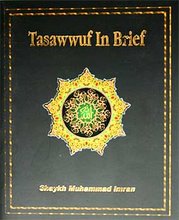
Wednesday 29 July 2009
Sunday 19 July 2009
Principles of trading
The Islamic Shariah has vigorously forbidden the consuming of Haram and has strongly encouraged Halal. Also the Shariah has forbidden the use of Haram sources to earn money and then to spend it in good causes. If a person was to make the effort to earn Halal then he will surely be able to earn. To fulfil ones needs, everyone is able to find suitable and Halal earning.
In greed for more wealth, one ends up to find Haram ways to earn a living.
Sayyiduna Abdullah bin Mas’ud Radiallahu Anhu reports that Rasulullah Sallallahu Alaihe Wasallam said, “Verily the angel Jibreel has instilled in my heart that a soul will never die until it fully receives its entire livelihood. Fear Allah! In search for your sustenance and choose the best path. (Mishkat)
In another Hadith it is mentioned:
“A person is deprived of livelihood by the sins he commits”. (Ibn Majah)
In another Hadith it is mentioned:
“Livelihood seeks a person out in the same way that his death does”. (Abu Nu’aym)
Trade and business is a means of consuming wealth. The Islamic Shariah has set out guidelines for it. Some people think that there are no rules and guidelines in earning a living.
In the Qur’an it is clearly stated “Allah has allowed trade and has forbidden usury”.
Allah has also forbidden whatever is obtained through gambling. Allah says in the Qur’an “the sin of them (alcohol/gambling) is greater then their benefit”. we learn from this verse that something that may be beneficial may not necessarily be Halal. Many people just look at the benefits and they fail to see if it is Halal or Haram.
Allah states in Surah al-Nisa:
يا ايهاالذين آمنوالا تاكلوا اموالكم بينكم باالباطل إلا أن تكون تجارة عن تراض منكم
O you who believe, do not devour each other’s property by false means, unless it is trade conducted with your mutual consent. (4:29)
In this verse, Allah mentions that do not devour each other’s wealth unlawfully.
The author of Ma’alimat tanzil writes:
باالحرام يعني باالربوا والقمار و الغضب والسرقة و الخيانة ونحوها و قيل هو العقود الفاسدة
“In this verse the word باالباطل (Batil) means usury, gambling, stealing, robbing, deceiving and bribing. Some have said that it means improper transactions which Shariah has forbidden. (Ma’alim Al-Tanzil)
The word ‘Batil’ holds a vast meaning. The best way to explain it would be to say that all the ways which is against the Shariah is batil.
By mentioning the term عن تراض “antraadin” (mutual agreement) is indicating that to obtain wealth through trade whilst both parties are in agreement, is permissible. Otherwise, to take somebody’s property or wealth by force is Haram and impermissible.
Some principles regarding business are mentioned here, these should be kept in mind at all times.
1. The transaction should have no usury involved in it.
2. Whatever Shariah has classified as Haram should not be bought or sold.
3. The items made for the sole purpose of sins should not be bought or sold.
4. The customers must not be lied to and one should not deceit them, nor should they hide the faults of the merchandise. Partners must be honest with one another.
5. Do not sell what you do not own.
6. If a person is forced to sell something do not take advantage of his situation and offer less than the market value.
7. The transaction must only be made by both parties mutual agreement.





